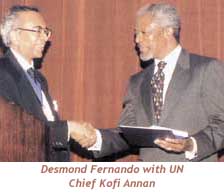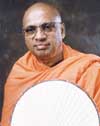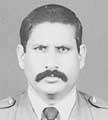

![]()
Elected to lead the International Bar Association through its 50th Anniversary year, President Desmond Fernando PC has spent much of 1997 engaged in discussions aimed at furthering the cause of global justice.
Since taking over the mantle a year ago from Scots lawyer J Ross Harper, Desmond's diary has featured a punishing schedule which has led him to countries including Argentina, Germany, India, the United Kingdom, Japan, the Netherlands, Taiwan, and the United States.
Working to promote the IBA, its aims and activities to people across the world, Mr Fernando's work has focused on issues as diverse as liberalisation of the legal profession, child abduction, and the ongoing libel actions against the United Nations' Special Rapporteur on the Independence of Judges and Lawyers, Dato' Param Cumaraswamy.
An active campaigner for civil rights in Sri Lanka, he has also spent a considerable amount of time overseeing the work of the IBA's Human Rights Institute - in particular its examination of the independence of the legal profession and the judiciary in Kenya and Pakistan - and working to improve the lot of lawyers and citizens around the world.
In January he presented a paper - The Legal Profession and Human Rights - at a reception hosted by the Bar Association of India, and in April, while attending the IBA South American Regional Conference in Buenos Aires, he met with senior members of the Argentinian Government, including President Dr Carlos Menem and the Minister of Justice, Dr Elias Jassan. In the same month Desmond visited Japan to discuss the coutntry's views on foreign legal consultants, and ended the month back in Sri Lanka, where the Supreme Court was hearing a challenge against the constitutionality of the Broadcasting Authority Bill.
In June, during the Association's 50th Anniversary Celebration in New
York, United Nations Secretary General Kofi Annan - the event's keynote
speaker - told Desmond and the 1000-strong delegation attending the Celebration
that the world would next year "take the final step toward global
justice" with the adoption of a Convention on the Establishment of
an International Criminal Court. 
Days later, during a session at the UN's New York Headquarters, Hams Corell, the UN Under-Secretary for Legal Affairs, reinforced his organisation's commitment to human rights and the ideals upheld and promoted by the IBA, when he told lawyers that international law must be applied in a consistent manner by all countries.
In a session which also included an address from Justice Louise Arbour, the Prosecutor at the International War Crimes Tribunal, Mr Corell warned that no country was beyond reproach, and said that the international legal community had an important role to play in explaining that human rights were universal and applicable in all states.
Two months later Desmond - accompanied by Peter Goldsmith QC, Chairman of the Human Rights Institute's Committee on Legal Systems, Procedures and the Independence of the Legal Profession - met the then Irish President Mary Robinson, now the UN High Commissioner for Human Rights, to discuss further co-operation between the IBA and the UN.
Desmond says the meeting was a fruitful one which signalled a strengthening of ties between the two organisations.
"A number of matters were discussed during our meeting with the High Commissioner in Dublin," says Mr Fernando. "It was clear from our meeting that the United Nations was keen to become further involved with us, and we also discussed the possibility of Mrs. Robinson addressing a future meeting of the IBA."
Of his remaining year in office, Desmond says he hopes to see continued growth in awareness of human rights, and of the necessity of all lawyers, regardless of their practice area, to become involved in upholding the rule of law.
"My first year in office has taught me a number of very important lessons," he says, "the most heartening of which is that there is a great deal of goodwill out there amongst lawyers around the world.
"In early 1997 I visited Japan, where the legal profession possesses a very high level of social consciousness, and lawyers spend a part of their time either as duty lawyers or visiting remote areas where there are no lawyers.
"The Universal Declaration on the Independence of the Legal Profession says it is the duty of bar associations as well as governments to ensure that there is adequate legal assistance for all people, and we should encourage all legal professionals to do this type of work."
The Mahanayake of Malwatte Chapter Siamese Sect with the consent of Maha Sangha has decided to appoint Ven. Diviyagaha Yasassi Thero as the Chief Judicial Sangha Nayake of Colombo Nava Korale. This title fell vacant after the demise of Thripitakachraya Rajakeeya Panditha Ven. Vitharandeniye Chandajothi Nayake Thero, Chief Incumbent of Sri Sambuddhaloka Vihara, Colombo, Fort, who lost his life as a result of a terrorist attack recently.
 Ven.
Yasassi Thero was born in 1935 as a son of Mr. and Mrs. D. S. Ratnanayake
notable devotees from Diyagaha, Matara. He entered the Order as a pupil
of Most Ven. Candegama Atthadassi Thero, High Priest of Matara Purana Vihara
and Ven. Diviyagha Wipulatissa Thero, Chief High Priest of Bodhirukkarama
Purana Vihara of Diviyagaha. He was a distinguished pupil of Sri Sudharsi
Pirivena of Matara and Vidyodaya Pirivena, Colombo. He graduated from Sri
Jayawardenepura University and obtained Diploma in Education from the University
of Colombo.
Ven.
Yasassi Thero was born in 1935 as a son of Mr. and Mrs. D. S. Ratnanayake
notable devotees from Diyagaha, Matara. He entered the Order as a pupil
of Most Ven. Candegama Atthadassi Thero, High Priest of Matara Purana Vihara
and Ven. Diviyagha Wipulatissa Thero, Chief High Priest of Bodhirukkarama
Purana Vihara of Diviyagaha. He was a distinguished pupil of Sri Sudharsi
Pirivena of Matara and Vidyodaya Pirivena, Colombo. He graduated from Sri
Jayawardenepura University and obtained Diploma in Education from the University
of Colombo.
He retired after serving the Education Department for 30 years of which 21 years were at Ananda College, Colombo where he ended as Vice Principal. In 1991, he was appointed as the Principal of Pirivena Teachers' Training College. He was the Organizing Secretary of the Sri Lanka Buddhist Congress, President of the Association of Chief High Priests of Dehiwela, Mount Lavinia and Ratmalana, Sri Lanka Organizer for Asia Buddhist Peace Movement and held many official posts in many other organizations.
At present, he is the Chief Incumbent of the Buddhist Institute at Watarappola Road, Mount Lavinia and Sri Bodhirukkaramaya at Diyagaha, Matara.
The presentation of the act of appointment will take place later.
K. B. Jayathilaka, (35) of 248/7, Kaduwela Road,
Malabe is suffering from acute leukaemia and is undergoing treatment at
the Maharagama Cancer Hospital, under clinical oncologist Dr. Jayantha
Balawardana. He is a police sergeant who was attached to the Special Task
Force and was engaged in operational duties in the eastern province for
nearly nine years.
According to Dr. Balawardana, a bone marrow transplant has to be performed immediately to save this patient's life. As this facility is not available in Sri Lanka, he would have to travel to India which will cost in the region of Rs. 2 million. As his family is not in a position to afford this amount they appeal to philanthropists and other willing donors to help him by remitting their contributions to account number 0320 207 015689 7 in the name of K. B. Jayathilaka at the People's Bank, Cotta Road Branch, Borella.
Sri Lanka's ministering angels hitherto an overlooked set of professionals, will soon be able to qualify for not only a degree in nursing but even a doctorate.
The local Florence Nightingales have often been at the receiving end of brickbats, what with their go-slow techniques and threatened strikes in the state sector. But the British School of Nursing soon to be set up here, the first of its kind in South East Asia, hopes to provide not only a new dimension but also a professional outlook to this noble profession.
Dr. Merril Samarasinghe, an Anaesthestist qualified in London is the coordinator between representatives from Britain and Sri Lanka. He said that presently "nowhere in the world are Sri Lankan nurses recognised. They serve only as trainee nurses, or nurse orderlies even in Middle Eastern countries."
Dr. Samarasinghe said that several British Universities have sent their project proposals. Among these are the Thames Valley University, Middlesex and De Montford Universities.
There is a Sri Lankan Board of Directors and the classes will be held at Aquinas University initially for 100 aspiring nurses. "This project is definitely going to upgrade the standard of nursing and the education of our nurses which will lead to a better health service," Dr. Samarasinghe said.
It is a sobering thought that today the number of nurses per 10,000 patients stands at only 76. Also more than 35 percent who practise nursing in Sri Lanka are considered unqualified to do so.
Dr. Samarasinghe said that nursing training in Sri Lanka is solely done by the Government Training School and the registration to practise as a qualified nurse is available to only those nurses.
The British School of Nursing intends to promote nurse education to international nursing standards and give it a professional image, social standing and financial remuneration to the same degree as enjoyed by their international counterparts.
The pre-requisites for this course are six credits at the 'O' Level including credits in English and one science subject. At the 'A'Level there must be three passes at the same sitting.
The institution will also provide an intensive course in English. The age of entry to the school has to be not less than 17 years.
"Those with a working knowledge of English will be chosen. The British doctors will also train lecturers so that they can lecture in Sinhala and Tamil. A medical dictionary in Sinhala and Tamil will also be provided," Dr. Samarasinghe explained.
"The Ven. Muruthtettuwe Ananda Thero, the President of the Nurses Union, has kindly offered us all support" Dr. Samarasinghe said.
"In fact with his consent we hope to make him the patron of our school."
"Minister Siripala de Silva has also offered his support as long as there is no clash between the Ven Ananda Thero and the Nurses Union."
The programme of work will consist of Surgical nursing, Theater nursing, Medical nursing, Renal nursing, Combat and Disaster nursing, Accident and Emergency nursing, Oncology nursing and Anesthetic nursing.
The cost of this three year degree course will be around Rs. 150, 000 per student as against Rupees 600,000 to get an Indian degree. This is, Dr. Samarasinghe said, a non profit making institution.
"Practical work will be at Asiri Hospital. Also training will be carried out in the classrooms and laboratories with mannequins and models and only those trained and experienced will go as trainee student nurses to a hospital," said Dr. Samarasinghe. British doctors from the various universities are expected early next month to map out their programme of education.
A nurse trained in this school, Dr. Samarasinghe said could command a salary of around fifty thousand rupees a month in a foreign hospital. Now a trained nurse over here earns only Rs 7,000.
The school will be affiliated to British Universities. It will be the first Lankan health Institute to be internationally accredited and recognised and Dr. Samarasinghe said it would contribute to the healthcare of the nation. "We hope that the Sri Lankan Medical Council will take this into account."
Continue to Plus page 11 * Couple's $2m art treasures go for $206m
Return to the Plus contents page
![]()
| HOME PAGE | FRONT PAGE | EDITORIAL/OPINION | NEWS / COMMENT | BUSINESS
Please send your comments and suggestions on this web site to
info@suntimes.is.lk or to
webmaster@infolabs.is.lk